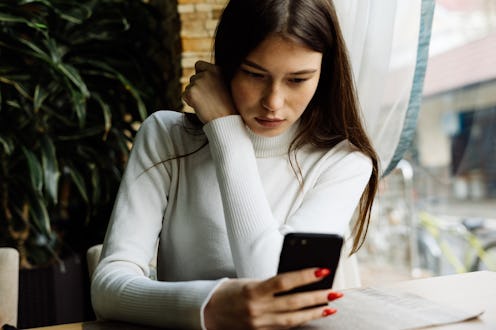Life
Experts Explain Why It Hurts So Much When Friends Stop Liking Your Instagram Posts

The affirmation from a liked photo or a heavily viewed Story on Instagram feels good — it's like a form of validation or support. But what happens to your brain when friends stop watching those Instagram Stories? Because we've all felt that pang of hurt when a post doesn't perform well, or when we realize our friends aren't engaging with our content, we reached out to experts to better understand the potential connection between trauma triggers and social media interaction.
According to experts, losing viewers, followers, or accolades on social media has a direct effect on our confidence in our friendships and overall sense of self. Though you can be consciously aware of the fact that you are not actually losing your friends physically, a decrease in engagement can register as something more sinister to the brain.
Melanie Shapiro, LICSW, EMDR, a certified psychotherapist, tells Bustle that "we have old memory networks that get triggered if we feel like a friend doesn’t like us or [view a story] but it's usually not about the friend or even the current situation at hand." Instead, she explains, "our memory networks get activated and can bring up old experiences of not feeling liked, (typically these feelings have older roots and can be activated when a situation has a similar feeling), thoughts, or even body sensation."
To stop this from happening, Shapiro suggests you attempt to discredit those feelings and remind yourself that they are old, and that it's merely the result of your memory networks being activated. "The more your brain can access the adult adaptive memory networks, the more resilient and more positive experiences and thoughts about yourself you have access to — helping you feel better about yourself and more connected and positive about your friends and relationships," Shapiro adds.
But if telling yourself that the way you feel in the moment is just a reaction to the past doesn't help you minimize that disappointment, you can try looking at the situation through another lens. Dr. Jeffrey B. Rubin, Ph.D, a psychotherapist, tells Bustle that sometimes people stop watching your Instagram Stories because they're distracted, busy, or something going on in their lives has made your content less appealing. Regardless, it's not always personal.
"We tend to measure ourselves in external ways, like by the reaction people have to what we post. And then we falsely link responding positively with liking us, and not responding with not liking us," Dr. Rubin points out. "We have to give people room and not draw erroneous connections between responding positively and us, and visa versa."
So long as you're not posting offensive content, you should give yourself the space to feel good about what you share, whether people are watching it or not. And when you do feel triggered by a post or Story your friends don't engage with, remind yourself that their action (or lack thereof), and your reaction, might be rooted in reasons outside of your friendship. If your friends show up for you IRL, don't be too hard on them for not showing up online. And if it's really bothering you, both experts agree that you can have a conversation offline with your friends to see if there's anything more to it. Or, consider creating a strong boundary for yourself and don't check to see who has viewed your Story.
Sources:
Melanie Shapiro, LICSW EMDR certified psychotherapist.
Dr. Jeffrey B. Rubin, Ph.D, psychotherapist, author, teacher.
This article was originally published on